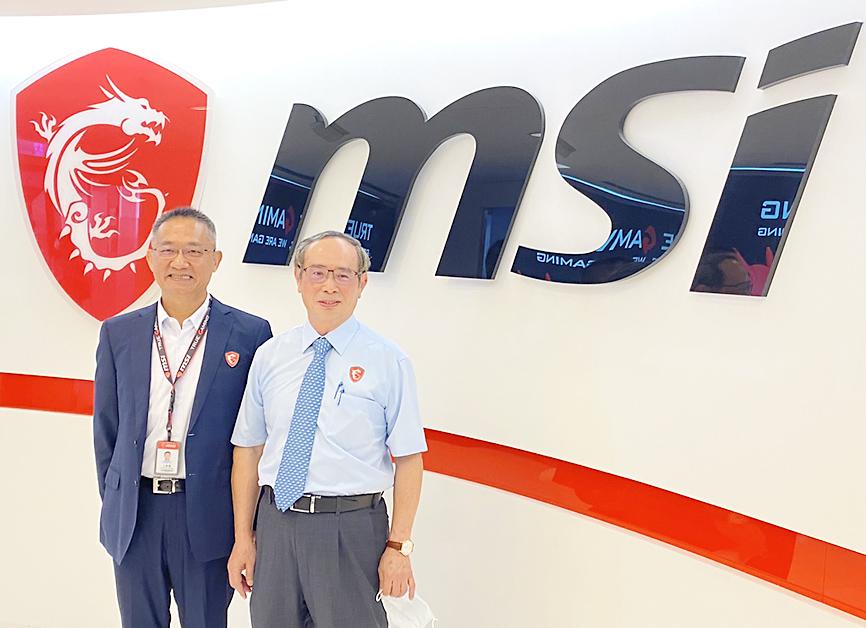Micro-Star International Co (MSI, 微星科技), which makes gaming computers, graphics cards and motherboards, is forecast to see revenue fall this quarter from last quarter due to supply tightness and seasonality, Credit Suisse Group AG said on Thursday.
The COVID-19 pandemic has caused an increase in orders due to work-from-home demand, leading to supply shortages.
Many components, especially central processing units, graphics processing units (GPUs), panels, driver ICs and power management ICs, are in short supply, analysts said.

Photo: CNA
MSI’s sales are forecast to decline 2.47 percent quarterly to NT$39.75 billion (US$1.38 billion) in the October-to-December period as component constraints would likely affect the company’s computer and graphics card sales, while its motherboard business might slow down due to seasonal factors, Credit Suisse said in a note.
Sales would also come under pressure as Nvidia Corp’s new Ampere-architecture GPU faces wafer production issues, it said.
“We previously expected MSI’s system and graphics card sales could further grow in the fourth quarter, as we believe new-generation GPU platform migration should provide further uplift to its gaming-centric business,” Credit Suisse analysts led by Jerry Su (蘇厚合) wrote in the note.
“However, the 8-inch wafer constraint and display tightness could impact MSI’s system shipments in the quarter, while graphics card momentum is also facing some bottleneck given Nvidia’s new GPUs are apparently having wafer foundry production issues,” they said.
MSI’s gross margin is expected to slide to 15.4 percent, from 15.8 percent in the third quarter, due to a change in its product mix, Credit Suisse said.
Higher logistics and transportation costs could remain a burden amid the pandemic and lower MSI’s operating margin to 7.3 percent, from 7.5 percent, it said.
Earnings per share are projected to fall to NT$2.97 from last quarter’s NT$3.09, it said.
MSI last week reported net profit of NT$2.61 billion for the third quarter, up 24.4 percent from the previous quarter and 52.58 percent from a year earlier.
Last quarter’s net profit marked the highest for a single quarter in the company’s history.
Revenue rose 15.33 percent quarter-on-quarter and 24.2 percent year-on-year to NT$40.76 billion, thanks to rush orders for PCs due to stay-at-home and teleworking demand.
In the first three quarters of this year, net profit totaled NT$5.97 billion, or earnings per share of NT$7.06, up 39.6 percent from a year earlier.
MSI has seen robust orders since June, with monthly revenue hovering at about NT$13.2 billion to NT$13.8 billion. Its cumulative revenue in the first 10 months of this year reached NT$118.44 billion, an annual increase of 18.13 percent.
The 8-inch wafer constraint and GPU tightness might push the company’s orders from this quarter to next year and support its sales momentum in the first half of next year, Credit Suisse said.
However, its sales outlook remains unclear for the second half of next year.
“Overall notebook shipments should be difficult to further grow in 2021, after a higher 2020 base, while graphics card sales could continue to grow on new product launches,” Credit Suisse said.

TECH BOOST: New TSMC wafer fabs in Arizona are to dramatically improve US advanced chip production, a report by market research firm TrendForce said With Taiwan Semiconductor Manufacturing Co (TSMC, 台積電) pouring large funds into Arizona, the US is expected to see an improvement in its status to become the second-largest maker of advanced semiconductors in 2027, Taipei-based market researcher TrendForce Corp (集邦科技) said in a report last week. TrendForce estimates the US would account for a 21 percent share in the global advanced integrated circuit (IC) production market by 2027, sharply up from the current 9 percent, as TSMC is investing US$65 billion to build three wafer fabs in Arizona, the report said. TrendForce defined the advanced chipmaking processes as the 7-nanometer process or more

Who would not want a social media audience that grows without new content? During the three years she paused production of her short do-it-yourself (DIY) farmer’s lifestyle videos, Chinese vlogger Li Ziqi (李子柒), 34, has seen her YouTube subscribers increase to 20.2 million from about 14 million. While YouTube is banned in China, her fan base there — although not the size of YouTube’s MrBeast, who has 330 million subscribers — is close to 100 million across the country’s social media platforms Douyin (抖音), Sina Weibo (新浪微博) and Xiaohongshu (小紅書). When Li finally released new videos last week — ending what has

OPEN SCIENCE: International collaboration on math and science will persevere even if the incoming Trump administration imposes strict controls, Nvidia’s CEO said Nvidia Corp CEO Jensen Huang (黃仁勳) said on Saturday that global cooperation in technology would continue even if the incoming US administration imposes stricter export controls on advanced computing products. US president-elect Donald Trump, in his first term in office, imposed restrictions on the sale of US technology to China citing national security — a policy continued under US President Joe Biden. The curbs forced Nvidia, the world’s leading maker of chips used for artificial intelligence (AI) applications, to change its product lineup in China. The US chipmaking giant last week reported record-high quarterly revenue on the back of strong AI chip

Qualcomm Inc’s interest in pursuing an acquisition of Intel Corp has cooled, people familiar with the matter said, upending what would have likely been one of the largest technology deals of all time. The complexities associated with acquiring all of Intel has made a deal less attractive to Qualcomm, said some of the people, asking not to be identified discussing confidential matters. It is always possible Qualcomm looks at pieces of Intel instead or rekindles its interest later, they added. Representatives for Qualcomm and Intel declined to comment. Qualcomm made a preliminary approach to Intel on a possible takeover, Bloomberg News and other media